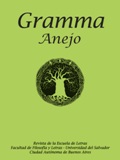TENSIONES ENTRE LO TESTIMONIAL, LO REAL, Y LO FICCIONAL EN LA PASIÓN SEGÚN TRELEW Y LA PATRIA FUSILADA
Keywords:
Nonfiction, Journalism, Literature, Plausibilization, TensionAbstract
Starting in the 19thcentury and with a higher emphasis in the 20th and 21st centuries, journalism has been used both as an instrument and a technique of plausibilization and fictionalization in Argentine literature. Nonfiction genres, which are closely related to journalism, operate within the dichotomy journalism-literature. Nonfiction creates a new intersection of history and fiction and entails a commitment to testimony; thus, it produces a tale that reflects the writer's narrative force and, while sticking to the facts, organizes them according to its own rules. This paper analyses the text La pasión según Trelew, by Tomás Eloy Martínez, and compares and contrasts it with Francisco Urondo's interview, La patria fusilada. Through a descriptive analysis, it will be shown that the interview format constitutes a way of resisting the plausibilization of conventional journalistic discourse, as opposed to the reconstruction of events in La pasión según Trelew which, in addition to the interviewees' opinions, features other voices that help in the reconstruction of events. It should be remembered that what these two nonfiction books have in common is the Trelew Massacre of August 1972 and the participation of the survivors. One of them is a journalistic narrative, whereas the other is a book of interviews.Downloads
Published
How to Cite
Issue
Section
License
Works published in this journal are licensed under a Creative Commons Attribution-NonCommercial-
Works published under this licence may be shared, copied and redistributed in any medium or format. Adaptation, remixing, transformation and creation are also authorised. Both sharing and adapting are permitted as long as credit is given to the work appropriately, providing a link to the licence and indicating whether changes have been made. Commercial use of the material is also not possible.








